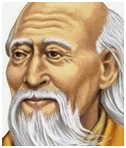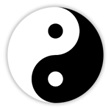|
 |
|
 |
|
|
||
Lao Tzu - Philosophy, Ethics and Success
Lao Tzu (c604-c531 BC)
Chinese philosopher and founder of Taoism. Pictured right is a likeness but nobody knows what he really looked like.
What did he teach about ethics and success? 1. Tao (the path or way) This has three different forms:
a) spiritual perfection Something beyond our bodies and senses (i.e. transcendent) that is:
In Christianity the equivalent is being with God but Lao Tzu didn’t believe in God.
b) mother of the universe The loving spirit and driving force of nature and the universe. c) the perfect way of life The principles leading to happiness and peace of mind (listed below).
2. “Wu-wei” and peace of mnd This is effortless creative action through:
So Lao Tzu distinguished between:
To do well, you must get the “being” right by:
3. Learn and be creative How?
“Life is an opportunity not an obligation”, Lao Tzu said. 4. “Yin” and “Yang” These are life’s opposites, and a happy life is a mixture of both opposites - for example:
So you must remember:
5. Be tough-minded but kind-hearted These are the feminine-masculine opposites of the yin and yang (see point 4):
To be the best person or leader, you need a mixture of the two:
But Lao Tzu said yin was more important than yang and rejected aggressive competition. This is what he meant when he said: “The softest things in the world overcome the hardest things in the world”.
6. Reflection and meditation Wonderful thoughts and peace come from:
Power and virtue come from within you. “Silence is the greatest revelation”, he said.
7. Simplicity and humility a) reduce your spending and desires (so that you don’t have to work so much).
b) seek simplicity Don’t overcomplicate your life.
c) be humble
8. Generosity, empowerment and leadership The best people and leaders:
9. Love nature, hate violence Nature is our friend to be loved and preserved, not our enemy to be conquered and destroyed. Violence and war are totally wrong.
10. Be flexible You must change and adapt to different situations. “An unbending tree will break”, Lao Tzu said.
A leader is best when people barely know that he exists...when his work is done, his aims fulfilled, they will all say, ‘We did this ourselves’. To lead people walk behind them.
Key quote on happiness Life is an opportunity not an obligation.
Key quote on success A journey of a thousand miles starts with a single step.
Key quote on peace of mind Silence is the greatest revelation. Seek without expecting. Find without taking.
Key quote on learning and wisdom Knowing others is intelligence; knowing yourself is true wisdom.
Key quote on influencing people He who conquers others is strong; he who conquers himself is mighty. When you are content to be simply yourself and don’t compare or compete, everybody will respect you.
Key quotes on management He who does not trust enough, will not be trusted. The inferior man seeks to put the blame on other persons, the superior man seeks the error within himself.
Key quote on ethics Simplicity, patience, compassion. These three are your greatest treasures.
Key quote on stress and pain If you want to be free, live simply.
Key quote on fear and anxiety If you measure success in terms of praise and criticism, your anxiety will be endless. |
|
|
||
|
|
||
| Copyright © wisdomtowin.com 2025 All Rights Reserved | ||
|














